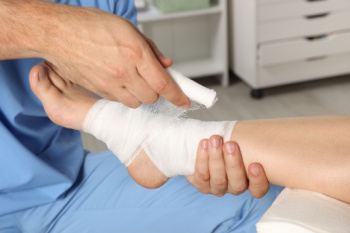Prevention and Treatment of Diabetic Foot Ulcers
Tuesday, 15 October 2024 00:00
Diabetic foot ulcers are a significant risk for people with diabetes, often leading to severe complications if not properly managed. These ulcers are open sores or wounds that usually occur on the bottom of the feet, caused by a combination of poor circulation and nerve damage, common in diabetic patients. Prevention is key in managing this risk. Daily foot inspections, maintaining proper foot hygiene, and wearing well-fitted shoes can help prevent ulcers. Managing blood sugar levels also plays a vital role in prevention. For those who develop foot ulcers, early treatment is critical. This includes cleaning and dressing the wound, controlling infection, and using custom orthotics or special footwear to alleviate pressure on the affected area. In more severe cases, surgical interventions may be necessary. If you have diabetes, and develop a foot ulcer, it is strongly suggested that you include a podiatrist on your health care team for routine care of your feet.
Wound care is an important part in dealing with diabetes. If you have diabetes and a foot wound or would like more information about wound care for diabetics, consult with Steven Spivak, DPM from Mount Holly Family Footcare. Our doctor will assess your condition and provide you with quality foot and ankle treatment.
What Is Wound Care?
Wound care is the practice of taking proper care of a wound. This can range from the smallest to the largest of wounds. While everyone can benefit from proper wound care, it is much more important for diabetics. Diabetics often suffer from poor blood circulation which causes wounds to heal much slower than they would in a non-diabetic.
What Is the Importance of Wound Care?
While it may not seem apparent with small ulcers on the foot, for diabetics, any size ulcer can become infected. Diabetics often also suffer from neuropathy, or nerve loss. This means they might not even feel when they have an ulcer on their foot. If the wound becomes severely infected, amputation may be necessary. Therefore, it is of the upmost importance to properly care for any and all foot wounds.
How to Care for Wounds
The best way to care for foot wounds is to prevent them. For diabetics, this means daily inspections of the feet for any signs of abnormalities or ulcers. It is also recommended to see a podiatrist several times a year for a foot inspection. If you do have an ulcer, run the wound under water to clear dirt from the wound; then apply antibiotic ointment to the wound and cover with a bandage. Bandages should be changed daily and keeping pressure off the wound is smart. It is advised to see a podiatrist, who can keep an eye on it.
If you have any questions, please feel free to contact our office located in Lumberton, NJ . We offer the newest diagnostic and treatment technologies for all your foot care needs.




